Bloggers need to know about the Digital Millennium Copyright Act of 1998. This act helps copyright owners protect their work online. Do you understand the legal risks of sharing content online? These risks include copyright laws and concerns about defamation. It can be hard to figure out the blogosphere’s legal side.
Nowadays, many people love blogging. It’s important to grasp the legal issues it brings. If you’re an individual or business with a blog, knowing the laws matters. This knowledge can keep you out of trouble and safeguard your rights.
This article will cover key legal issues for bloggers. We’ll discuss copyright and trademark laws, defamation, and privacy. Learning about these laws is vital. It ensures your blogging experience is enjoyable and legally safe.
Copyright Laws and Blogging
For bloggers, knowing copyright laws is very important. These laws are there to protect original creations like texts, songs, and photos. If you use someone else’s work in your blog, like images, quotes, or songs, make sure you have the right to use them. Using such material without permission might lead to legal trouble. It can cause issues like copyright infringement.
Understanding Copyright Protection
Once created, original works get automatic copyright protection. Even without a specific copyright notice, they are still under the law. So, as a blogger, knowing about these laws is crucial. Always ensure you are not using someone else’s work without permission.
Fair Use Doctrine
There’s something called the fair use doctrine. It lets people use copyrighted works without permission for certain reasons. These include criticism, news, teaching, and research. But, it’s not a simple rule. You need to know the guidelines to use this exception correctly. This way, you can avoid breaking copyright laws.
Obtaining Licenses and Permissions
If you plan to use copyrighted items on your blog, you need the proper legal rights. This could mean getting a license, paying a fee, or following usage rules. By getting these permissions, you can enjoy using the material without legal issues. It’s key to act responsibly and ethically when it comes to content use.
Trademark Laws and Branding
If you’re a blogger, knowing about trademark laws is key, especially for building your personal brand or business. A trademark is any symbol, name, or phrase that represents a brand. It helps people tell your brand apart from others. It’s essential to protect your brand’s property. This keeps others from using your brand’s content without permission.
Protecting Your Brand
To keep your brand safe, consider trademarking your blog’s name, logo, or anything else unique. By doing this, you have the law on your side. If someone else tries to use your branded content, you can stop them. Also, stay on top of where your brand shows up online. If you spot any misuse, address it fast. This avoids any big legal headaches later.
Avoiding Trademark Infringement
It’s vital for bloggers to understand how to use trademarks correctly. This means not using another brand’s name, logo, or anything else that sets them apart without permission. If you accidentally use a trademark in the wrong way, you might face legal trouble. This could be anything from getting a warning to a full-blown lawsuit. The best way to stay out of hot water is to check on any trademark you plan to use in your blog. If you need permission, get it before you publish.

Defamation and Libel Concerns
As a blogger, defamation and libel laws are critical. Defamation refers to untrue statements that harm someone’s reputation. Libel, a written form of defamation, has serious consequences. It can lead to lawsuits or demands for corrections.
Fact-checking and Responsible Reporting
To stay clear of defamation and libel, always fact-check your blog posts. Verify everything, like claims or details, about others. Having solid proof for your statements is crucial.
The business of blogging involves many legal risks. Ensure your writing is accurate and honest. This helps avoid defamation or libel troubles.
Freedom of Speech for Bloggers
Your freedom of speech as a blogger is crucial. It lets you share your thoughts without fear of government control. But remember, there are limits to this right, especially concerning what you say online.
Limitations on Free Speech
Although the First Amendment gives us the right to free speech, it doesn’t cover everything. For instance, you shouldn’t post false information to hurt someone (defamation) or share content that could cause violence. It’s also illegal to use others’ work without permission (copyright law).
Platform Terms of Service
When you use a platform like social media or a blog site, you have to follow their rules too. These rules often ban hate speech, explicit content, or spam. If you break these rules, your posts might get deleted or your account shut down.
As a blogger, understanding the balance between your right to speak freely and respecting the law is crucial. Adhering to both the law and platform rules makes your blog a better place for everyone. It ensures that your voice is heard without crossing legal or ethical lines.

Privacy Laws and Data Protection
As a blogger, it’s key to know and follow privacy laws. This is crucial when your posts include personal details or gather data.
Today, rules like the GDPR and CCPA affect how you use and keep personal data. They determine what you can do with your readers’ info.
Collecting and Using Personal Information
Your blog might gather details like names or emails from readers. It’s important to explain clearly how you use this info. Plus, you need to get permission. Violating these laws can lead to severe fines and legal trouble.
Cookies and Tracking Technologies
Using cookies and tracking tools on your site means you must follow privacy laws. Make sure to share how and why you use these tools in your privacy policy. Give visitors ways to control their data. Meeting laws like the California Online Privacy Protection Act (CalOPPA) and the General Data Protection Regulation (GDPR) helps you avoid problems.
Transparency and Consent
It’s vital to be clear about how you collect and use data. You should also ask for permission. Having a detailed privacy policy will make you more trustworthy. It will also help you stay on the right side of the law.
By knowing and sticking to the rules, you protect your blog and your readers. Creating a strong privacy policy and using data safely are key. They ensure you blog legally and responsibly.
Disclosure Requirements
Understanding disclosure laws is key for bloggers. These laws apply to making money from sponsored content, ads, and affiliate links. Bloggers must be clear if they get any money or gifts for talking about products.
Sponsored Content and Advertising
Being paid or getting free items to talk about a brand means you must tell your readers. The Federal Trade Commission (FTC) guidelines in the U.S. say you must use terms like “ad,” “advertisement,” or “sponsored” clearly. Don’t hide these notices within hashtags or links.
Affiliate Marketing Disclosures
If you make money from affiliate links, you need to let your readers know. Use direct terms like “affiliate link” or “I earn a commission.” Avoid using unclear terms like “sp,” “spon,” or “collab.
Bloggers must follow disclosure rules to keep their credibility and avoid legal issues. By being honest about getting paid, you show your readers that they can trust you. This makes your content more real and helpful.
Legal Considerations for Bloggers
It’s important for bloggers to know the laws that cover what they do online. This includes copyright, defamation, and privacy. Also, knowing about disclosure rules and terms of service is key for a successful blog.
Understanding Your Rights and Responsibilities
Knowing your rights and responsibilities is crucial, no matter if you’re just starting out or already successful. Laws for bloggers can change based on where you live and your blog’s focus. Keeping up with these laws helps you avoid problems and keep your earnings steady.
It’s vital to be aware of the legal aspects of blogging to protect yourself and your work. Staying informed and taking action as needed ensures your blog is in good legal standing. This will keep it a great place for your readers despite the challenges of legalities.

The Digital Millennium Copyright Act (DMCA)
As a blogger, knowing about the Digital Millennium Copyright Act (DMCA) is key. It helps when thinking about the legal stuff for bloggers. The DMCA, a U.S. law, manages how copyrighted stuff is used online. It’s really important for keeping copyright owners and online service providers, which includes bloggers, safe.
Takedown Notices and Counter-Notices
Copyright owners under the DMCA can send takedown notices to platforms. They may ask for content that supposedly breaks their copyright to be taken down. The platform must act fast if a proper takedown notice is received. They need to remove the disputed content or stop anyone from seeing it. But, there’s also a way for people who think their content was wrongly taken down to fight back. They can send a counter-notice, and their content might be back up in 10 days.
Safe Harbor Provisions
The DMCA also includes “safe harbor” clauses to help Internet service providers (ISPs). This covers blog hosting services and such. ISPs can avoid being on the hook for their users’ copyright issues if they follow certain rules. These include having a clear notice-and-takedown system and registering with the U.S. Copyright Office. With these steps, ISPs are in a safer place legally when it comes to what their users post.
The DMCA really is about balancing the needs of copyright owners, online services, and users, like bloggers. Knowing the DMCA’s rules is crucial for bloggers who want to protect their rights and steer clear of legal problems. This is especially true when using copyrighted stuff on their blogs.

Advertising Laws for Bloggers
If you’re a blogger, you might share about products or services to your audience. But, it’s key to know the advertising rules. These rules make sure ads are honest, not misleading, and show if the blogger got any benefits.
Truth in Advertising Regulations
Under FTC rules, bloggers must tell if they get paid to promote something. This disclosure is necessary if you’re paid or get any perk to talk about a product or service. Not telling your audience about these connections can have legal effects.
Endorsement and Testimonial Guidelines
Being honest matters. You can’t say things about products or services that aren’t proven to be right. Anything you say must be true and can be checked. Also, be careful with using other people’s testimonials. There are rules about disclosing those too.
Knowing and following the law helps protect your blogging business and keeps people believing in you. It’s crucial to stay updated on the rules. This way, you can use your blog to make money the right way, avoiding any trouble.

Intellectual Property Infringement
It’s crucial to know about intellectual property infringement as a blogger. This includes
, trademark, and patent issues. Knowing these laws helps keep your content safe and avoids lawsuits.
Copyright Infringement
Copyright law gives owners exclusive rights to their content. Be careful with others’ images, videos, or writing. Reproducing without permission is copyright infringement. It’s key to get licenses or use fair use for criticism, commentary, or news.
Trademark Infringement
Trademarks are names, logos, or symbols showing a product source. Avoid using others’ trademarks without permission. This includes similar terms on your blog. Infringing can cause legal trouble and harm your brand’s name.
Patent Infringement
Although patents are rare in blogging, they matter. Patents protect unique inventions or processes. Without permission, you could face legal action for using patented ideas. Ensure you have the right permissions if your blog talks about such products or services.
Understanding these intellectual property issues is vital for your blog’s safety. Stay well-informed and seek legal help when needed. This keeps you out of trouble in the complex area of blogging and intellectual property rights.
Legal Risks of User-Generated Content
As a blogger, you might invite user-generated content like comments, guest posts, or submissions. This helps create engagement and a strong community around your blog. But, there are legal risks involved that you need to handle carefully.
Comment Moderation
Allowing readers to comment can bring legal problems. Comments might have bad statements, steal others’ work, or break your rules. To avoid these issues, it’s key to check comments before they go live on your blog.
Liability for Third-Party Content
You should also watch your back for what others post on your blog, like guest posts or reader comments. Even if you didn’t make the content, you could still face legal trouble. Be safe by setting up rules for user content, like checking it and the power to delete or edit anything that goes against your guidelines.
Knowing and managing the legal risks of what your users post helps keep your blog’s community active and safe. Always stay on top of the law in blogging. This is key for your growth and lasting presence online.

